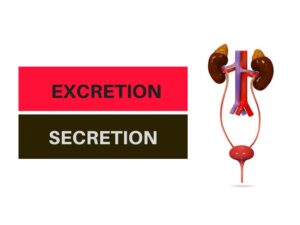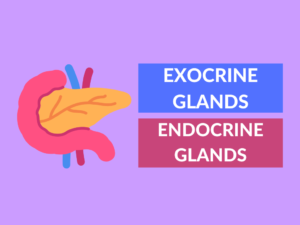Difference Between Secretion and Excretion
What is Secretion?
Secretion is the process of producing and releasing substances, known as secretions, by specific cells or glands in an
organism. These secretions are utilized for various physiological functions.
Examples of Secretion:
- The salivary glands secrete saliva to aid in the digestion of food.
- The endocrine system secretes hormones such as insulin, which regulates blood sugar levels.
- The lacrimal glands secrete tears to keep the surface of the eyes moist.
Uses of Secretion:
- Facilitating digestion and nutrient absorption.
- Regulating bodily functions and maintaining homeostasis.
- Moistening various organs or surfaces.
- Facilitating communication between cells.
What is Excretion?
Excretion is the process of eliminating waste products from an organism’s body. These waste products are often produced
as a result of various metabolic processes or substances that are no longer needed by the body.
Examples of Excretion:
- The kidneys excrete metabolic waste products in urine.
- The lungs excrete carbon dioxide, a waste product of cellular respiration.
- The skin excretes sweat, which helps regulate body temperature.
Uses of Excretion:
- Removing metabolic waste products from the body.
- Filtering and maintaining the balance of various substances in the body.
- Eliminating harmful substances or toxins that may have entered the body.
Differences between Secretion and Excretion:
| Difference Area | Secretion | Excretion |
|---|---|---|
| Process | Production and release of substances by specific cells or glands. | Elimination of waste products from the body. |
| Function | Aids in physiological processes and bodily functions. | Removes waste materials to maintain homeostasis. |
| Nature of Substances | Substances produced are necessary for the body’s functions. | Substances eliminated are waste or no longer required by the body. |
| Organs Involved | Cells or glands that produce specific secretions. | Organs involved in eliminating waste materials. |
| Examples | Saliva, tears, hormones. | Urine, carbon dioxide, sweat. |
| Purpose | Facilitates absorption, communication, and maintenance of bodily functions. | Removal of waste products, regulation of substances, and detoxification. |
| Location | Specific cells or glands throughout the body. | Particularly kidneys, lungs, skin, and digestive system. |
| Timing | Ongoing process based on functional needs. | Occurs as and when waste materials are produced or toxins enter the body. |
| Requirement for Survival | Necessary for healthy functioning and survival. | Essential for maintaining optimal health and preventing harm. |
| Disorder or Dysfunction | Imbalance or dysfunction may lead to various health conditions. | Impaired excretion can cause toxic buildup and diseases. |
Conclusion:
In conclusion, while both secretion and excretion involve the release or elimination of substances, they differ in their
purpose, process, and nature of substances. Secretion aids in bodily functions and maintaining homeostasis, while excretion
primarily focuses on waste removal and regulation of substances. Understanding the differences between these two processes
is crucial for grasping the complexity of an organism’s internal functions and overall health.
Knowledge Check:
- True or False: Secretion is the process of eliminating waste materials from the body.
- Which of the following is an example of secretion?
a) Urine
b) Sweat
c) Saliva
d) Carbon dioxide - What is the main purpose of excretion?
a) Facilitating digestion
b) Removing waste products
c) Regulating blood sugar levels
d) Maintaining homeostasis - How do secretion and excretion differ?
a) Secretion releases necessary substances, while excretion eliminates waste materials
b) Secretion regulates substances, while excretion aids in digestion
c) Secretion involves the lungs, while excretion involves the kidneys
d) Secretion and excretion are the same processes - What can happen if there is a dysfunction in excretion?
a) Enhanced bodily functions
b) Toxic buildup and the development of diseases
c) Increased energy levels
d) Improved digestion - True or False: Secretion and excretion occur in the same location within an organism.
- Give an example of a substance that is secreted.
- Choose the correct statement:
a) Secretion aids in maintaining balance, while excretion helps with communication
b) Secretion removes waste products, while excretion releases necessary substances
c) Secretion and excretion are interchangeable terms
d) Secretion and excretion have no relationship - What is the main difference between secretion and excretion?
a) Secretion eliminates waste materials, while excretion releases substances necessary for bodily functions
b) Secretion is a one-time process, while excretion is ongoing
c) Secretion only occurs in the digestive system, while excretion involves multiple organs
d) Secretion and excretion serve the same purpose - True or False: Dysfunction in either secretion or excretion can lead to health conditions or diseases.
Answer: False.
Answer: c) Saliva.
Answer: b) Removing waste products.
Answer: a) Secretion releases necessary substances, while excretion eliminates waste materials.
Answer: b) Toxic buildup and the development of diseases.
Answer: False.
Answer: Hormones.
Answer: a) Secretion aids in maintaining balance, while excretion helps with communication.
Answer: a) Secretion eliminates waste materials, while excretion releases substances necessary for bodily functions.
Answer: True.
Related Topics:
- Similarities and Differences Between Endocrine and Exocrine Glands
- The Importance of Homeostasis in Organisms
- Understanding the Role of the Kidneys in Maintaining Balance
- How Metabolic Waste Products Impact Overall Health




